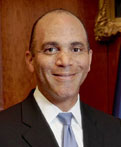Chief justice of Texas promotes equal access to justice in Brennan Lecture (VIDEO)
Chief Justice Wallace Jefferson of the Supreme Court of Texas delivered the 19th annual Justice William J. Brennan Lecture on State Courts and Social Justice on February 27. In his lecture, titled “Liberty and Justice for Some: How the Legal System Falls Short in Protecting Basic Rights,” Jefferson highlighted a lack of equal access to justice for not only the indigent, but also the middle class.
 Jonathan Lippman ’68, chief judge of the New York Court of Appeals, introduced Jefferson’s speech, pointing out that Jefferson has taken the lead in striving to make justice available to everyone despite socioeconomic status, a cause close to Lippman’s heart. “To me,” said Lippman, “he is a kindred soul in his unswerving commitment to and recognition of the judiciary’s unique role in pursuing justice in this country.”
Jonathan Lippman ’68, chief judge of the New York Court of Appeals, introduced Jefferson’s speech, pointing out that Jefferson has taken the lead in striving to make justice available to everyone despite socioeconomic status, a cause close to Lippman’s heart. “To me,” said Lippman, “he is a kindred soul in his unswerving commitment to and recognition of the judiciary’s unique role in pursuing justice in this country.”
Jefferson, for his part, said that New York State’s initiatives promoting equal access to the legal system had inspired him to pursue similar aims on behalf of Texas citizens; Lippman’s predecessor as New York’s chief judge, Judith Kaye ’62, had even invited Jefferson to New York to learn about the Empire State’s methodologies.
“The rule of law, practiced by experts in the legal profession, exists to afford a remedy even for the poor, the ignorant, the powerless,” said Jefferson. “Yet in the real world, many fundamental rights are illusory. We are not living up to the ideal.... A larger swath of litigation exists in which the parties lack wealth, insurance is absent, and public funding is not available. Some of our most essential rights—those involving our families, our homes, our livelihoods—are the least protected.”
Jefferson explained that in some cases it is easier for the poor to find legal aid than the middle class, whose incomes are too high to qualify for assistance but too low to afford a lawyer easily. As a result, people are increasingly representing themselves, even as the number of attorneys per capita in the U.S. has more than doubled in the past half-century.
He argued that, while pro bono efforts by practicing lawyers are crucial, they are not sufficient to address the problem. Jefferson enumerated ways to address the ongoing reality of significant numbers of pro se litigants: working harder to provide due process for those representing themselves, making available standard forms that litigants can fill out easily, opening help centers for those navigating the judicial system on their own, and allowing limited-license legal technicians as an alternative to full-fledged lawyers, as Washington State has done.
The legal profession, Jefferson noted, has been slow to embrace the new realities: “Time and again, in the name of protecting core values, the profession has rejected reform efforts. But as one commentator has asked: ‘What good are the profession’s core values to those who do not make it through the lawyer’s office door?’... Courts must step in, because those who lack access to justice are a constituency without a voice. Am I suggesting that lawyers are the root of our system’s ills? Not at all. But when vast segments of our society are unable to utilize the legal system, we must examine whether we should change the way legal services are delivered and how courts can create more accessible systems.”
Watch the full video (1 hr, 15 min):

